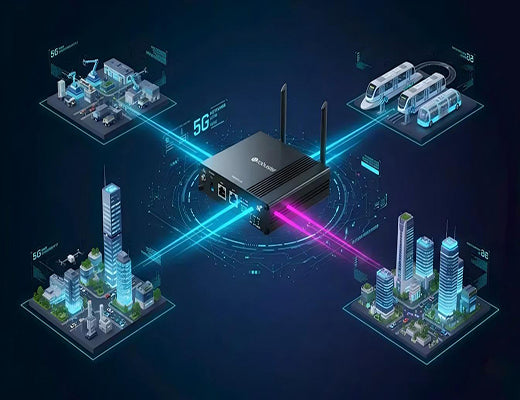
5G Router: The Ultimate Tool for High-Speed Networks
|
|
Time to read 6 min
|
|
Time to read 6 min
This article dives into the transformative power of the 5G router, moving beyond just speed to explore its critical role in modern industrial and enterprise applications.
We'll break down how features like low latency, robust security, and advanced cloud management are making 5G routers indispensable for everything from business continuity and smart city infrastructure to telemedicine and industrial automation.
You'll gain a clear understanding of what sets an industrial 5G router apart and what key features to look for when making a purchasing decision.
Let's be clear: when we talk about a 5G router, we're talking about more than just faster movie downloads. For businesses and industries, 5G technology represents a monumental leap in what's possible. It's the key to unlocking real-time data transfer, ensuring constant uptime for critical operations, and building the resilient networks that power our modern world. In my experience, the real 'aha!' moment for many engineers isn't just seeing the speed, but understanding the reliability and responsiveness a 5G router brings to the table. Isn't it time we looked past the hype and into the real-world applications that are changing the game? This article will do just that, exploring how this powerful tool is becoming the backbone of the next industrial revolution.
While the jump from 4G to 5G is often framed around speed, the true advantages for industrial and mission-critical applications are far more nuanced. A modern industrial 5G router is engineered to be the heart of a resilient, secure, and manageable network.
The secret sauce of 5G isn't just its high bandwidth; it's the ultra-low latency. We're talking about reducing the delay between sending and receiving information to just a few milliseconds. This near-instantaneous communication is critical for applications where a split-second delay can have major consequences. Think about a smart traffic grid adjusting signals in real-time to clear a path for an ambulance or an automated guided vehicle (AGV) in a warehouse needing to make an instant decision to avoid a collision.
Furthermore, reliability is non-negotiable in industrial settings. That's why top-tier industrial 5G routers are built with features designed for constant uptime:
5G VPN router. It's not an afterthought; it's a foundational requirement. These routers run on hardened, Linux-based operating systems like RobustOS, which undergo extensive third-party penetration testing to ensure they're secure against real-world attacks. They also support a full suite of enterprise-grade VPN protocols (IPsec, OpenVPN, Wireguard, etc.) to create secure, encrypted tunnels for all data, protecting sensitive information from the edge device all the way to the cloud.The combination of high speed, low latency, and high reliability makes the 5G router a perfect fit for a growing number of demanding applications. I've seen these devices completely transform operations across various sectors.
Imagine a busy retail store during the holiday season. The primary fiber internet connection goes down. In the past, this meant chaos—credit card terminals offline, customer data inaccessible, and a complete halt to sales. By deploying an industrial 5G router as a failover solution, this disaster becomes a non-event. The router detects the primary outage and, in under 30 seconds, switches the entire branch's network to a high-speed 5G connection. Business continues as usual, and the company avoids thousands in lost revenue.
Cities are leveraging high-speed 5G connectivity to build smarter, safer, and more efficient infrastructure.
Not all 5G routers are created equal. When you're selecting a device for a critical application, you're not just buying hardware; you're investing in a solution.
Here's a checklist of what to look for, using a product like the Robustel R5020 Lite as a benchmark:
A1: Yes, absolutely. For many businesses, 5G wireless broadband is now a viable primary internet connection. Cellular operators can offer unlimited 5G tariffs at competitive prices, and the speed and reliability can often match or exceed traditional wired options, allowing you to "cut the cord" and simplify your setup.
A2: The key differences are reliability, security, and ruggedization. An industrial 5G router is designed for harsh environments with a wide temperature range and durable housing. It includes enterprise-grade security features like advanced VPNs and a hardened OS. Finally, it's built for "always-on" connectivity with features like dual-SIM failover and is manageable at scale through a cloud platform, which consumer devices lack.
A3: Yes, when implemented correctly. The 5G standard itself has enhanced security features. When you use an industrial 5G VPN router, you add multiple extra layers of protection. By forcing all traffic through a secure and encrypted VPN tunnel, you ensure that your data is protected from the device to your private network or cloud, making it suitable even for sensitive financial or public safety applications.


